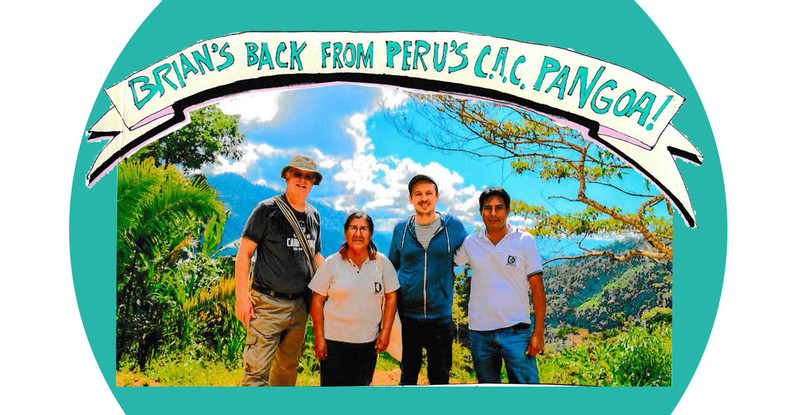Sweetwater General Manager Brian Condra went down to hang with one of the coffee world’s most revered fair traders, Esperanza Dionisia Castillo, who helped bring the C.A.C. Pangoa coffee co-op back to life from the ravages of civil war. She works tirelessly to uplift her Pangoa farmer members who grow the coffees we use in our delicious, organic single origins and blends. She also supports their efforts to diversify their incomes, helping to guide Pangoa’s cacao production for worldwide sales and support farmers’ efforts to harvest and sell honey. Esperanza led Brian’s group during their 4-day visit to Pangoa’s headquarters- located in central Peru, adjacent to Amazonian rainforests.
How was it different doing a cupping in Peru than here? Did you learn anything new about cupping?
We did a cupping at Pangoa’s Quality Control Lab. We tasted several coffees that were near the end of their drying phase. Their cuppers would cycle through all of the individual farmer crops on a daily basis as they dry on the patio and take notes of the profiles and see if it is ready for export. At this stage of cupping, grassy notes were still present in certain cups. I found out that these grassy notes are very normal at this stage and that they would be eliminated by continuing to dry a little more on the patio and while in transit to roasters.
What were the people like at Pangoa HQ?
Everyone was super friendly and full of hospitality. They really went out of their way to make sure that we were taken care of and had a very well-rounded experience.
What city were you in? Did you travel to other cities/towns?
CAC Pangoa is located in San Martin de Pangoa, east of the Andes and bordering the Peruvian Amazon. We visited four very different farms and got to see how some simple infrastructure could reduce some of the labor-intensive aspects of processing that help maintain the coffee’s quality before it reaches the cooperative. On one of the days, we drove up an old dirt road along the side of a mountain for two-and-a-half hours in order to visit two of the farms. We also traveled through a dozen different small villages and towns on the way to San Martin de Pangoa.
Did you meet Esperanza? What was she like?
We spent the majority of our time with Esperanza who is the General Manager of C.A.C. Pangoa. She is an incredible woman. It was great to spend time with her and see how she has strengthened the cooperative and the community as a local leader.
What sort of artists did you see around the area, and what were they making/working on?
We spent an evening at one of Pangoa’s Centers of Excellence. This is a model farm that also showcases ways to add additional streams of revenue via ecotourism and a place for the local community to gather. They upcycled just about everything on the property in a creative and artistic way.
What are some challenges they're facing at Pangoa right now?
There has been a recent trend of pineapple and ginger farming in the area. These crops are easier to grow and fetch a decent price in the market. The problem is that you need a lot of sunlight, so farmers have to clear the land to grow these crops. Along with diseases like Roya, this is an appealing option for some local farmers but is not very sustainable in the long run. Convincing farmers to continue to develop their land organically and to improve the quality of coffee in a sustainable long-term fashion for revenue vs receiving short-term payouts is a newer issue that they are having to address.
What were your 3 favorite things about the trip?
1- The human element. Meeting with the farmer members and staff at Pangoa and gaining insight into just how much work has to happen in order for us consumers to be able to drink a decent cup of coffee. It is incredible when you meet the people who are truly doing the hard work in the world of coffee. I can’t drink a cup without being grateful to these people.
2- Hanging out and watching Peru play a game in the World Cup (even though they lost) while in San Martin de Pangoa.
3- Experiencing first-hand just how special it is for Sweetwater to be a member of Cooperative Coffees. By coming together, we are a very unique and special group of roasters who can help to positively impact the lives of our farming partners. We had representation from four roaster members on this trip. The various roles that each person plays at each roastery are all equally important to ensuring that we as a group are helping to support our farmer partners in their desire to create a better quality of life in their communities.
What are some things Florida coffee drinkers might not realize about Pangoa's coffee?
When you buy a coffee that has been sourced fairly from a farmer cooperative like Pangoa, you are supporting a system that strengthens and enriches the local community where that coffee is grown.


